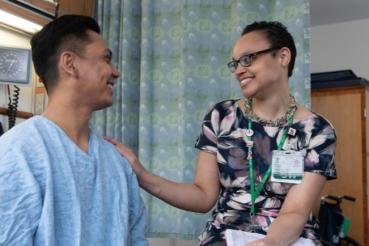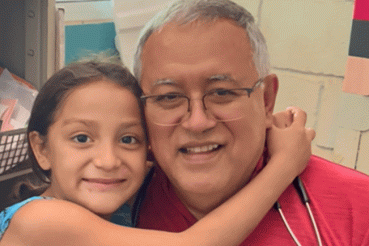(CHICAGO) — Rush University Medical Center received a $5 million donation today from BMO Harris Bank to expand a unique model of care that educates and trains students for new health care jobs needed to deliver high-quality, coordinated health care to Chicago’s underserved and low-income West and South Side communities.
This initiative is the only one in the country that brings together patient care, education, community service and rigorous evaluation designed to reduce costly emergency room visits and hospitalizations.
“We believe the approach to training and delivery of health care furthered by BMO Harris Bank’s donation is our best bet to combat current barriers to health care access,” said Dr. Larry Goodman, CEO of Rush. “We are optimistic that this model is the future for delivering health care for Medicaid and low-income patients.”
The funding will strengthen and accelerate existing health care partnerships among Rush, the Medical Home Network (MHN) and City Colleges of Chicago, creating new, sustainable models of care through numerous programs to:
- Offer new training and education opportunities through Rush University and Malcolm X College, one of the City Colleges of Chicago. Rush, MHN and Malcolm X College will work together to identify needed health care roles and develop curriculum that will prepare students to fill these roles.
- Accelerate and enhance the Medical Home Network’s system of coordinated care that shares patient information among participating health institutions and addresses the common health concerns of residents in Chicago’s high-poverty West and South Side communities.
“This partnership is exactly the type of innovation we are looking for in Chicago, so we can train and educate a workforce that will be ready to fill the jobs of tomorrow,” said Mayor Rahm Emanuel. “The pipeline of health care workers that will come out of this partnership and the efforts of our City Colleges will improve the lives of Chicagoans for generations to come.”
"We commend Dr. Goodman, the team at Rush and their partners for creating such a compelling initiative. The issues of health, education, medical services and poverty are all key elements of BMO's community efforts and areas where we know we can make a difference," said Bill Downe, President and CEO, BMO Financial Group. "We are especially pleased that this initiative will at the same time improve health care and create valuable jobs in the Chicago communities that most need them."
For many people, the complexity of accessing appropriate care results in delaying treatment or unnecessary and costly trips to emergency rooms. Multiple health care providers often treat the same patient with little shared communication. This fragmentation of care and duplication of services decreases the quality of care patients receive, while also increasing costs to the health care system.
The BMO Harris Bank funding will advance Rush’s efforts to improve access to high quality health care for hundreds of thousands of medically disadvantaged Chicagoans by enhancing existing coordinated health programs, as well as developing new programs.
- Rush will bolster its existing collaboration with Malcolm X College, helping to develop new curriculum that will train students in emerging health care roles. Malcolm X College is being re-established as a destination for health care training as part of the City Colleges of Chicago “Colleges to Careers” initiative.
- Five new scholarships at Rush will give Malcolm X College graduates the opportunity to continue their education with the Bachelor of Science in Health Sciences at Rush University, which also include guaranteed internships in their respective fields.
- Recipients of four new Health Disparities Fellowships at Rush will focus on reducing health disparities and evaluating the initiative’s effectiveness—turning them into the future leaders in community health.
- Rush will provide inter-professional education to teams of health care providers within the Medical Home Network (MHN), which unites public and private organizations to improve the health of Chicagoans through coordination of patient care.
- Rush will create new student-led initiatives in medically underserved communities to improve access to high quality health care.
City Colleges of Chicago has partnered with Rush on its College to Careers initiative to create more relevant health care education programs to help address the skills gap in Chicago.
“Removing barriers to care requires new collaborative approaches to give Chicagoans the skills to seize the tens of thousands of new positions that will be required to meet the region’s health care needs over the coming decade,” said Cheryl Hyman, Chancellor of City Colleges of Chicago. “Health education needs more curriculum integration where educators and practitioners work to solve the interrelated problems of access to training and access to care. Rush has been a steadfast partner dedicated to communities, and the generosity of BMO Harris Bank will allow us to build on our joint commitment.”
“The BMO Harris donation allows us to further develop our innovative, patient-centered care management model,” said Cheryl Lulias, president and executive director of the Medical Home Network. “Achieving a new level of patient care coordination requires real-time event reporting, actionable analytics and a dynamic health care workforce with more community health workers. These workforce teams strengthen the medical home, which is at the center of a connected and easy-to-navigate health care system that engages patients to invest in and improve their health. This program will ensure that we have the health care workers that are necessary for our new models of care to improve the health status of our communities’ most vulnerable members.”



